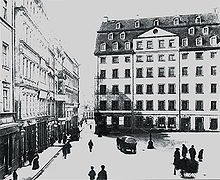Johann Heinrich Winkler or Winckler (12 March 1703 – 18 May 1770) was a German physicist and philosopher.
Biography
Early life
Winckler was born in Wingendorf, a village in Silesia. He was educated at Leipzig University. One of his teachers was Andreas Rüdiger, an opponent of Christian Wolff. Winckler read Wolff's works and defended him against Rudiger during his lessons.
Career

In 1731, he was appointed a teacher (collega quartus) at St. Thomas School in Leipzig. The building was enlarged the same year and he wrote the libretto of Froher Tag, verlangte Stunde, a cantata to mark the completion of the project. It was set to music by his colleague Johann Sebastian Bach and performed in the summer of 1732.
Winckler authored a textbook of philosophy first published in 1735 and a second edition in 1742. In 1739, he became professor of philosophy at Leipzig university and professor of Latin and Greek in 1742. In 1750, he became professor of physics. He was elected president of the university eight times.

Winckler is best known for his electrical experimentation research. In 1744, Winckler authored, Gedanken von den Eigenschaften, Wirkungen und Ursachen der Electricität: nebst einer Beschreibung zwo neuer electrischen Machinen (Thoughts on the Properties, Effects, and Causes of Electricity: Together with a Description of Two New Electrical Machines, 1744).
Winckler and the Royal Society

Winckler was elected to the Royal Society in 1747. The Royal Society, which spelled his name Winkler, published information about his electrical experiments in their Philosophical Transactions.
Animal rights
Winckler authored a series of essays between 1741–1743 on the existence of animal souls. He took an anti-Cartesian position and was convinced that animals have intelligence and possess sensitive souls. Winckler's textbook Institutiones Philosophiae Universae, published in 1762, drew ethical conclusions from his views on animal souls. Winckler argued that since animals have sensitive souls, there is no valid reason why it should be permissible to torment them. Winckler stated that human beings should cause as little pain as possible to animals when using them or killing them for food.
Winckler's writings on animal souls similar to Johann Friedrich Ludwig Volckmann, John Hildrop, Richard Dean and Laurids Smith have been described as narrowing the gap between animals and human beings and starting "the idea of animal protection on the basis of animal psychology."
Selected publications
- Institutiones Philosophiae Universae (1742, 1762)
- Untersuchung von dem Seyn und Wesen der Seelen der Thiere (1742–1745).
- Gedanken von den Eigenschaften, Wirkungen und Ursachen der Electricität: nebst einer Beschreibung zwo neuer electrischen Machinen (1744)
References
- ^ Klemme, Heiner F; Kuehn, Manfred. (2016). The Bloomsbury Dictionary of Eighteenth-Century German Philosophers. Bloomsbury Publishing. p. 857. ISBN 978-1-4742-5597-4
- "Cantata BWV Anh 18". bach-cantatas. Retrieved 5 October 2015.
- "Scientist of the Day - Johann Winkler". Linda Hall Library. Retrieved 18 August 2021.
- An Account of Professor Winkler's Experiments Relating to Odours Passing through Electrised Globes and Tubes... doi: 10.1098/rstl.1751.0035 Phil. Trans. 1751 vol. 47 231-241
- ^ Maehle, Andreas-Holger. Cruelty and Kindness to the 'Brute Creation': Stability and Change in the Ethics of the Man-Animal Relationship, 1600-1850. In Aubrey Manning and James Serpell. (2003). Animals and Human Society: Changing Perspectives. Routledge. p. 88. ISBN 0-415-09155-1
- 1703 births
- 1770 deaths
- 18th-century German philosophers
- 18th-century German physicists
- German experimental physicists
- Foreign members of the Royal Society
- German animal rights scholars
- German cantata librettists
- German schoolteachers
- Academic staff of Leipzig University
- St. Thomas School, Leipzig teachers
- Leipzig University alumni